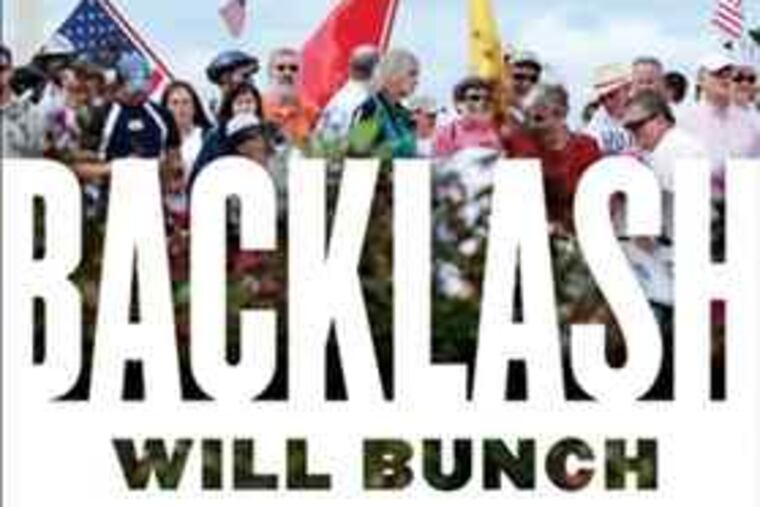'Backlash' looks at anti-Obama anger in America
Today's political pendulum swings with such frequency and ferocity that it's no wonder a centrist position seems elusive. Even before Barack Obama had a chance to get settled in the White House, a vocal and vigorous movement was working not only to oppose him but also to orchestrate his downfall.

Right-Wing Radicals, High-Def Hucksters,
and Paranoid Politics in the Age of Obama
By Will Bunch
Harper, 354 pp. $25.99
nolead ends nolead begins
Reviewed by Robert Schmuhl
Today's political pendulum swings with such frequency and ferocity that it's no wonder a centrist position seems elusive. Even before Barack Obama had a chance to get settled in the White House, a vocal and vigorous movement was working not only to oppose him but also to orchestrate his downfall.
Welcome to the fear-fueled, full-boil anger that Will Bunch portrays in The Backlash. A senior writer at the Philadelphia Daily News and husband of Inquirer staff writer Kathy Boccella, Bunch takes to the road to report what animates anti-Obama Americans. The book will be released Tuesday. For anyone uninitiated in this crusade of unrelenting criticism, The Backlash will be a read on the wild side.
As Bunch documents on almost every page, excoriation of the Oval Office occupant is personal and at the highest decibel of free speech. Obama is (take your pick) a socialist, a communist, a new Hitler, a Manchurian candidate, even the Antichrist. Each epithet does more than demean; there's a larger purpose at work. One Arizona minister interviewed isn't reluctant to say he's praying for the president's death.
Several circumstances feed such anger. The current economy, with its troubling unemployment, middling growth, and declining confidence, is a definite factor, especially for people in their 50s or early 60s. The new media, with their abundance of single-minded messages and 24/7 connectivity, play another key role. And America is dramatically changing in terms of demography and socio-economic makeup.
In short, patterns established during the latter decades of the 20th century no longer exist. Adjusting to a new world - of which Obama is both symbol and embodiment - can become a bridge too far for some people, with foursquare opposition a more satisfying place to be.
Bunch describes the contemporary landscape with skill, and he provides context by looking back to the writings of historian Richard Hofstadter and communications theorist Neil Postman. In the early 1960s, Hofstadter identified "the paranoid style in American politics" as an evergreen trait that repeatedly flowered in U.S. soil, while Postman (particularly in his 1985 book, Amusing Ourselves to Death) argued that entertainment on broadcast airwaves overwhelmed - and supplanted - the educational function of the printed word.
Hofstadter and Postman help explain forces of "the backlash" in the land, but Bunch transports the reader to tea party rallies, John Birch Society dinners, Oath Keeper gatherings, gun shows, and other ports of call where those harboring Obama paranoia congregate.
Much of Bunch's detailed reporting takes place in the environs of Philadelphia and Pittsburgh, but he also visits several other regions. Arizona receives special attention because that's "where the world is seeing the dire consequences of this whole backlash movement - the most alarming rips in the very fabric of national unity in a century a half, a nation that appears to be coming apart at the seams for the second time in its young history."
Amid the mountains and cacti, Bunch wonders whether it's possible to get to the bottom of the seemingly bottomless Arizona anger. One sentence puts the situation in perspective:
Specifically, it is unknown how much of this fury directed toward Washington was really concern over big government or federal deficits or the specifics of health-care legislation and how much was just simply discomfort or even raw hatred that a black man was in the White House, coupled with anxiety over the economy that translated into rage against the powerless who were even lower down the ladder, illegal immigrants supposedly sopping up the legal residents' tax dollars or - up North - the "handout people" in black neighborhoods.
An early chapter in The Backlash is titled "The Becklash." Multi-platform performer Glenn Beck keeps popping up and sounding off as Bunch conducts his reporting. Beck's radio and television programs provide daily marching orders for the politically angry, and we see him and his faithful followers at a book signing near Philadelphia and during a seven-hour "American Revival" in Orlando.
Bunch finds Beck less mean-spirited than Rush Limbaugh and blessed with "genius amid the mayhem." Fear underpins Beck's message, and the merchandise he pushes - such as food emergency kits and gold investment plans - caters to that emotion. With Beck's 2009 income reportedly $32 million, Bunch wryly observes that "there is no product that Beck promotes with greater zeal and religiosity than Glenn Beck himself."
Treatment of Beck is more analytical than critical, an approach one finds throughout the book. Although there's little doubt about the writer's progressive viewpoint, Bunch states, "I always tried to report fairly, to listen to what people had to say, and to report their words and their actions accurately."
The Backlash won't be the last word on the anti-Obama movement, but it's an often revealing and scarily sobering midterm report that provokes a prime question: If political extremism and paranoia become more pronounced, will the ideological and partisan pendulum continue to swing - and never stop to solve the nation's problems?